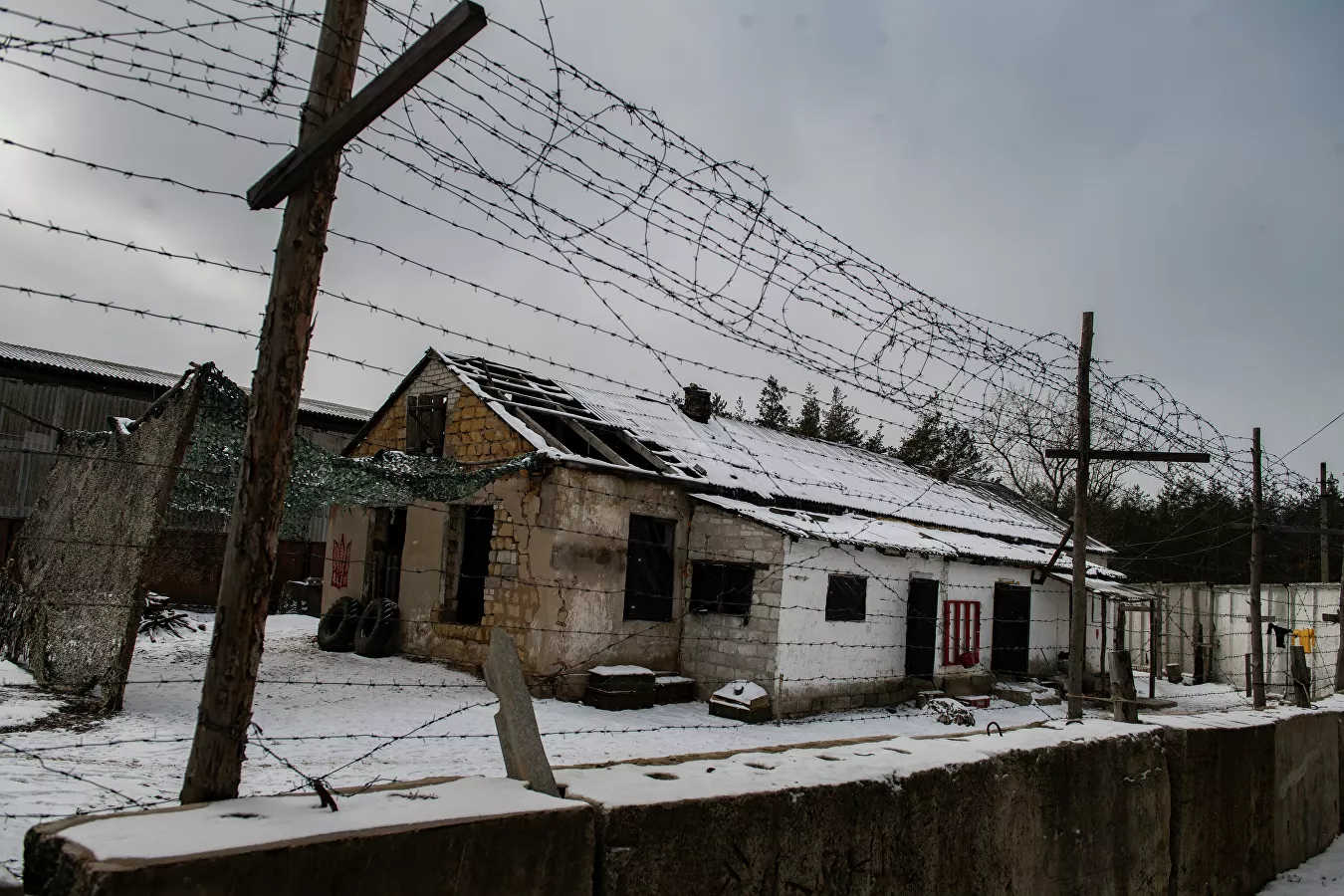Ultranationalist and openly neo-Nazi paramilitary groups were given free reign to run rampant in Ukraine after the victory of the Maidan coup d’état in Kiev in February 2014.
These forces, most of which are now integrated into the Ukrainian National Guard, have been accused of war crimes by the UNHCR and Amnesty International.

Former inmates of an illegal secret prison in the village of Polovinkino, Lugansk region run by the neo-Nazi Aidar Battalion have testified on the conditions of their imprisonment to officials from the Lugansk People’s Republic’s Ministry of State Security. A Sputnik correspondent spoke to some of them.
The prison, situated in the smokehouse of a local abandoned sausage factory, was set up in 2014, and contained captured LPR militia members and their suspected sympathizers. Local residents and random people pulled off the street also ended up imprisoned in the makeshift jail.
The random prisoners included Dmitri Kurlyandsky, an auto mechanic from the village of Georgievka outside the city of Lugansk.
“My neighbour came under fire and got wounded. I took him to the hospital. On the way, we stumbled upon an Aidar checkpoint,” Kurlyandsky told Sputnik.
The man and his neighbour were locked up at Polovinkino for three weeks.
“We were beaten often. One militiaman had the word ‘separ’ [as in ‘Separatist’ –ed] carved into his chest with a knife,” Kurlyandsky said.
Militiaman Ivan Maslov and his commander were captured in the town of Schastye, Lugansk region. The men were taken to Polovinkino and imprisoned in a cell without mattresses, a toilet, or any provisions to wash themselves or help heal their wounds.
“We slept on the ashes that remained from the smokehouses,” Maslov recalled. The prisoners were forced to go to the bathroom in the cell. “You’d dig a hole, like a cat, and do your business,” he said.
The former inmate said prisoners were often taken to a separate torture room, which guards referred to as the “procedure room.”
“They asked where are your Russians, where are your Chechens, where the tanks were and how much I sold Ukraine for. I didn’t sell it. I stood up for my homeland,” the Lugansk native said.
Maslov’s commander was fatally poisoned. “In the morning they fed us, and in the afternoon my commander became ill. He was delirious, began hallucinating, and then died.” The militiaman says he still doesn’t know where his comrade-in-arms was buried. He believes the poisoning was deliberate.
“We are searching for a cemetery in the vicinity of Polovinkino where the victims of Aidar were buried, and continue to collect evidence and to investigate the war crimes of the battalion,” an investigator with the LPR’s Ministry of State Security said.
‘Procedures Have Been Simplified’
Created in May 2014 as a ‘territorial defence’ volunteer battalion subordinated to the Ukrainian military, Aidar was formally ‘disbanded’ in 2015 and integrated into the 53rd Mechanized Brigade of the Ukrainian Ground Forces. The 400-man-strong unit played an active part in the war in Donbas against local People’s Militia units.
Aidar’s personnel have also been accused of war crimes ranging from looting and torture to the killing of unarmed militiamen and civilians.
Observers from the Organization for Security Co-operation in Europe’s Special Monitoring Mission in Ukraine have known about Aidar’s Polovinkino prison since at least August 2014, when a man testified to having been arrested by the militants and held illegally at the jail on separatism charges. The man said militants threatened to murder his wife if he did not pay them over $10,000 US. After paying the ransom, he was released.
The Office of the High Commissioner for Human Rights took note of Aidar’s activities in a 2015 report, citing 110 criminal cases against the volunteer unit for crimes ranging from abduction to threats and violence, including against even Ukraine’s own law enforcement authorities. A 2016 update pointed to suspected Aidar involvement in looting and the seizure of property – including homes, from local residents. One individual is feared to have been killed by militants who seized his vehicle.
Aidar also appeared repeatedly in a separate OHCHR report on conflict-related sexual violence in Ukraine released in 2017. In one incident, Aidar members under the influence of intoxicants were said to have attacked and beat a woman in the street, with local police said to have refrained from intervening for fear of provoking the militants.
Amnesty International also reported on the militant group’s activities, with a 2014 report suggesting that some of their actions may fall under the category of war crimes. An Aidar commander told an Amnesty researcher that eastern Ukraine was “not Europe. It’s a bit different. There is a war here. The law has changed, procedures have been simplified…If I choose to, I can have you arrested right now, put a bag over your head and lock you up in a cellar for 30 days on suspicion of aiding separatists.”
Aidar is just one of multiple volunteer battalions formed in Ukraine in the aftermath of the coup in Kiev in 2014, with others including the internationally known Azov, Dnipro-1, Dnipro-2, Donbass, Kryvbass, Kherson, and the Right Sector’s Ukrainian Volunteer Corps (DUK).
Notwithstanding credible allegations of criminal behaviour, and multiple criminal cases against Aidar opened even by the post-coup Ukrainian authorities, the Ukrainian president’s office has awarded Aidar fighters medals for “for courage,” as well as the Order of Bogdan Khmelnitsky, a state award for “special merit in protecting state sovereignty, territorial integrity, and strengthening the defence capability and security of Ukraine.”
“They are what they are” Zelensky defended neo-nazis in the latest Fox news interview.
This video was taken down after few hours but you can find other’s upload.
Watch https://m.youtube.com/watch?v=9iQlxSuo8Pk before this is also censored lol.